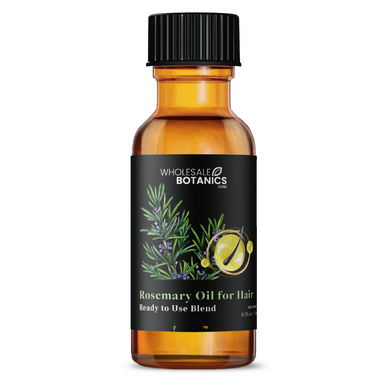
Rosemary Oil for Hair
Studies have suggested that rosemary oil can benefit the appearance of hair and scalp. Though this product is formulated to be safe and effective o...
View full detailsChoosing essential oils that suit your hair goals can be a great way to enhance your haircare routine naturally and without buying expensive hair treatment products.
Different oils can provide specific benefits for your hair. Rosemary essential oil may stimulate your hair roots, lavender essential oil can offer a soothing sensation for your scalp, cedarwood essential oil may support the appearance of fuller-looking hair, peppermint essential oil can provide a cooling sensation to your scalp, and clary sage oil may help promote soft hair.
Keep in mind that you should also choose an oil whose fragrance you love, since the fragrance can sometimes linger throughout the day.
To help you get the most out of your haircare routine, we’ve answered the most frequently asked questions about essential oils below.
It is not recommended to use essential oils directly on your scalp. However, if you dilute the oil with a carrier oil (or use one of our ready-to-use blends) or mix it into your hair mask, shampoo, or conditioner, it’s then typically safe to apply to your scalp. Remember to always perform a patch test first (with a carrier oil) and avoid using it if you notice any irritation or discomfort.
On average, you will want to apply hair oil two to three times a week for best results. However, individuals with very oily hair may want to stick to once or twice a week.
If you have very dry hair, leaving a gentle oil in overnight is often helpful. However, if you have naturally oilier hair or if you are using stronger oils, leaving the oil overnight can cause irritation, flakiness, dryness, or itchiness. In those cases, it’s best to leave the oil in your hair for a short time and then rinse it out.
The best way to wash oil out of your hair is to use a sulfate-free clarifying shampoo. If you have very dry hair, you may want to consider using a clarifying shampoo made to moisturize and cleanse as you wash the oil out of your hair.
In general, it is a better idea to apply your essential oils to dry hair, as oil and water don’t mix well. If you find it’s difficult to apply oil to your hair when it's dry, you can slightly dampen your hair first.
Essential hair oils will not typically yield immediate results, which is the case for most haircare products. Depending on your routine and the types of essential oils you are using, you might see more noticeable results between one and three months of consistent usage.